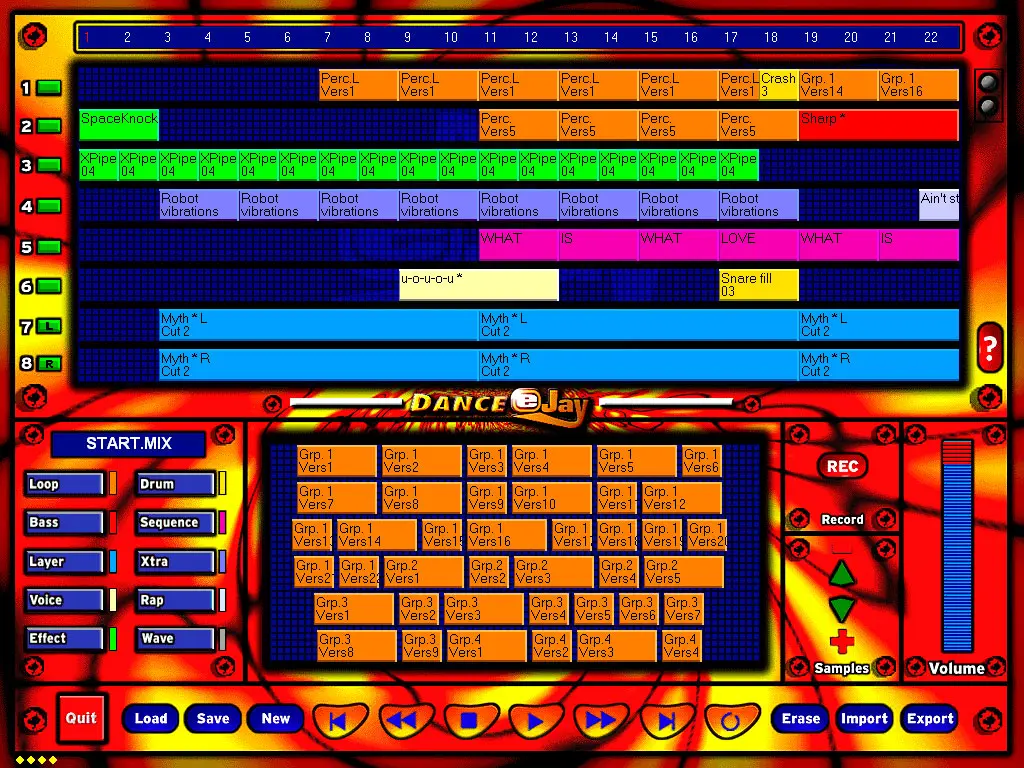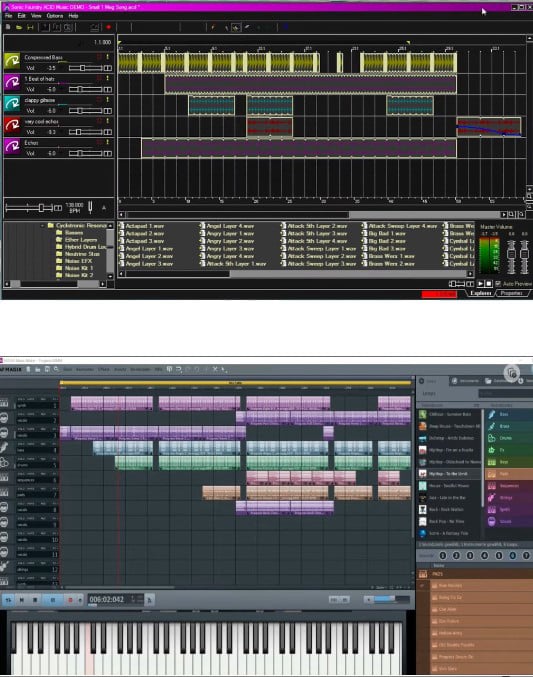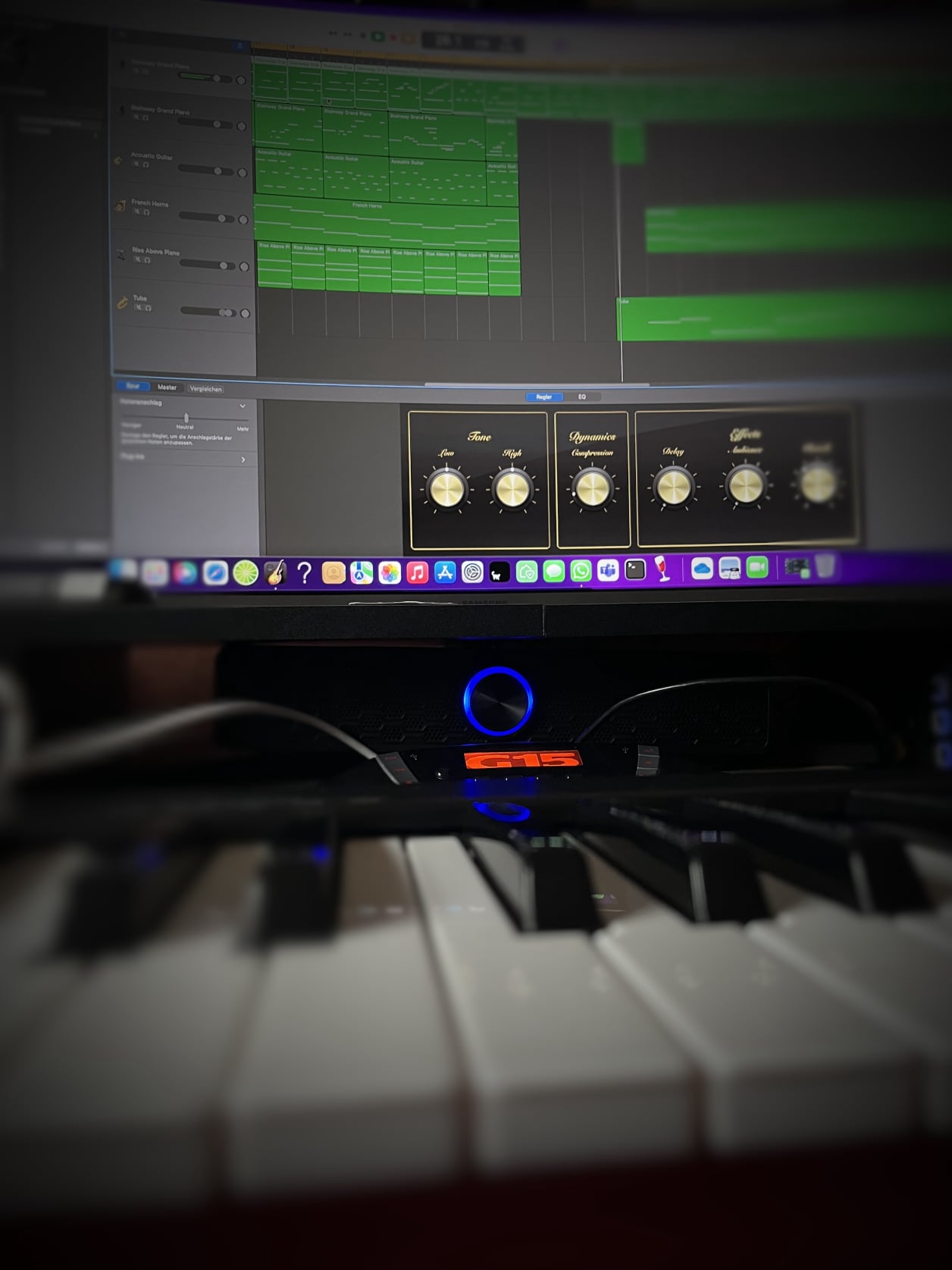Different eras...
The "early days" - Modules on Amiga
1990 - 1997
Modules on Amiga500 were created with a TRACKER-Software.
Those trackers were a very common approach in these days and even famous artists of genres like "Eurodance" created their tracks with these tools.
A TRACKER is a tool with 4 - 8 input lines (called "Tracks").
Basically you've had those available like an audio-channel. Instruments were placed in one of 64 time-slots of an input line. Additional information like note, length, volume or bending is stored in a coded format and can be altered as long as the note is playing.
Protracker (see screenshot) was tending to crash alot.
Famous last words of an Amiga500 were "Guru meditation".
If not saved, the module was lost and you could start over.
(Images from Wikipedia.org)

The rising era - Early capabilities of PCs
1997 - 1999
As PCs came into fashion, Music-creating software did not wait long to transfer to them.
There had been a few great programs in the beginning, like eJay's Dance ejay1, called "Dance-Machine".
"Making" music in this time was putting premade samples together, arranging things, more then really composing. It was easy to tell if a song had been made with these tools but the outcome sometimes was really good, depending on the samplekit you have bought additionally.
Thinking back, I consider those tools were primary designed to create music-"loops" rather than perfect songs. But it kinda worked out.
(Images from ejay)

The rising era - PCs can do more! (DAW)
1998 - 2022
After a few years, some more capable software came available for PCs. The hardware was still a bottleneck and without a dedicated sound card making music on PCs really sucked due to latency and lack of capabilities. So a dedicated sound card like those from "Soundblaster" had been a must-have.
Sonic Foundry's "Acid Music" (top image) was my first contact with a rudimentary DAW (Digital Audio Workstation). It had MIDI-Capabilities and was easy to handle. The approach was either to arrange samples (most likely they were loops)- like in Dance-Machine before - or to combine with MIDI-inputs (Hardware-bottleneck). Within a small range, those loops could be changed in note, length and sound. And samples started to move away from "Dance-Music-only" - thanks! Acid evolved over many years to a well-known Tool and is still available with loads of features.
Magix Music Maker (lower image) already came around in 1994 but came to my attraction around 1998. There were a few approaches possible to create a whole song.
The "easy approach" was to use samples, just like in "Dance-Machine" and "Acid" before and put them together. Limited outcome, but unlike before, samples were available in different genres and also notes, so a bit of altering and individual taste was possible in creating a song out of these in a style desired.
The "advanced approach" was to use MIDI-Instruments available to buy or attach own MIDI-Hardware or inputs (like my electronic guitar and the pedals). Music Maker delivered those MIDI-Instruments as well and upgrading with new content was possible. "Real" songs became a possibility and it was a charm to add premade drums or lyrics from those samples (if they fit).
(Images from YouTube)

The current days - MIDI on Mac
2022 - now
By the year 2022 an used Mac Mini (2014) came to my hands for free. I first was not sure what to do with it - lacking knowledge of the capabilities. After some testing it turned out - yes, it's a great machine for making music indeed but lacking performance.
So I upgraded it with an NVMe-SSD and tried it again. Oh, what a difference - I was happy. This setup lasted 2 more years until I finally made a huge step forward getting a new Mac Mini (M2).
When it comes to DAW-software for MAC I'm still using the basics at the moment. Garage Band. Don't get me wrong - Garage Band is a great tool and easy to use. But more advanced artists may smile about this tool being called a DAW.
Garage Band indeed has great capabilities. It has a huge amount of inbuilt MIDI-Instruments and samples (which I do not use often). It has some kind of "AI-Drummers" with different styles and alterations. That was the moment I also bought a MIDI-Keyboard as an addition to my guitar input.
What this program lacks is lyrics or singing. To be honest: I can't sing. Many of my songs so far were instrumentals. Where to get those great singers and not reverting to Magix?
I stumbled upon "Looperman" - a website for artists primarily creating free to use or commercial loops and also found some more resources providing commercial material to use for.
So that's the journey so far - and everything als always:
Non-commercial, just for the fun of it.